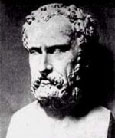![]()
![]()
Ancient Philosophy
The Presocratics – Pythagoras and Xenophanes
Primary Sources:
- Pythagoras and Xenophanes, Fragments from Baird and Kaufmann, Ancient Philosophy, pp. 11-15.
- Pythagoras and Xenophanes, Additional Fragments (Handout).
Background:
From Hermann S. Schibli’s Routlegde Online Encyclopedia article on Pythagoras:
Pythagoras of Samos was an early Greek sage and religious innovator. He taught the kinship of all life and the immortality and transmigration of the soul. Pythagoras founded a religious community of men and women in southern Italy that was also of considerable political influence. His followers, who became known as Pythagoreans, went beyond these essentially religious beliefs of the master to develop philosophical, mathematical, astronomical, and musical theories with which they tended to credit Pythagoras himself. The tradition established by Pythagoras weaves through much of Greek philosophy, leaving its mark particularly on the thought of Empedocles, Plato, and later Platonists.
Pythagoras, son of Mnesarchus, was born on the island of Samos. For the first half of his life Pythagoras traveled widely, not only in Greece but supposedly also in Egypt, Phoenicia and Babylonia, where he is reputed to have acquired much of his knowledge and religious wisdom. Perhaps to escape the rule of Polycrates, the tyrant of Samos, he emigrated to Croton in southern Italy. His moral stature and eloquence gained him many adherents. With his followers, both men and women, Pythagoras practiced a simple, communal life whose goal was to live in harmony with the divine. To that end he prescribed a regimen of purification that included dietary restrictions, periods of silence and contemplation, and other ascetic practices. In addition to the religious and monastic aspects of the Pythagorean society, we hear of Pythagorean political associations (hetaireiai) that played an important role in the public affairs of Croton and other southern Italian cities (it appears they initiated social reforms and supported aristocratic constitutions). After a time their dominance came to be resented and a ‘Pythagorean revolt’ ensued, in the course of which many Pythagoreans were killed or scattered abroad. Pythagoras himself, possibly as a result of this upheaval, moved to Metapontum where he died.
Already during his lifetime Pythagoras was regarded with near religious veneration. It is therefore not surprising that the stories told about him after his death should turn into hagiology and include many fantastic elements: that Pythagoras was the Hyperborean Apollo and had a golden thigh to prove it; that he was seen in two places at one time; that he could converse with animals and control natural phenomena. Pythagoras’ wonder-working clearly belongs to the realm of legend, although it reinforces the picture of him as a ‘shaman’. A more difficult matter is to establish what Pythagoras actually taught, since the oral and then the written traditions attribute to him not only miracles but also sophisticated mathematical and philosophical achievements. This habit of tracing all things back to the master, coupled with evidence of the quasi-religious avoidance of uttering his name, is typified in the expression common among Pythagoreans: ‘he himself said’. However, because Pythagoras wrote nothing and shrouded his lectures in secrecy, it is impossible to verify all that is ascribed to him. What remains certain is that he was a highly influential religious teacher whose main tenets dealt with the soul and the rites required for its purification and salvation. This made the Pythagorean movement especially popular in Magna Graecia, a fertile soil for mystery cults of all kinds. Pythagoras is also connected with certain ‘Orphic’ writings, since these share eschatological concerns similar to his oral teachings. For these reasons the following account will emphasize those doctrines that accord with Pythagoras’ reputation as an early Greek sage and religious innovator (for the philosophical and scientific theories traditionally associated with his name).
From J. H. Lesher’s Routlegde Online Encyclopedia article on Xenophanes:
Xenophanes was a philosophically minded poet who lived in various cities of ancient Greece. He is best remembered for an early comment on the limits of knowledge, a critique of anthropomorphism in religion and an advance towards monotheism. The surviving fragments of his poems span a wide range of topics, from proper behavior at symposia and the measures of personal excellence to the nature of the divine, the forces that rule nature and how much can be discovered by mortals concerning matters in either realm. Both Plato and Aristotle characterized him as the founder of Eleatic philosophy, a view echoed in the pseudo-Aristotelian treatise, On Melissus, Xenophanes and Gorgias, and in ancient doxographical summaries. But in many of his poems Xenophanes speaks as a civic counselor and inquirer into nature in the tradition of the philosopher-scientists of Miletus. While his one, unmoving, whole and eternal divinity bears some resemblance to Parmenides’ ‘being’, in other teachings he anticipates the views of Heraclitus and Empedocles. His comments on divine perfection, the limited utility of the victorious athlete and the need to restrict poetic expression all foreshadow views expressed by Plato in the Republic.
Ancient reports of his contacts with other philosophers are few and inconclusive, but the reference to a puppy which possessed the soul of a friend shows some awareness of Pythagorean teachings and the remarks about earth, sun, sea, waters and rainbow display an interest in matters investigated by the Milesians. Herodotus reports Xenophanes’ ‘admiration’ or ‘wonder’ (or perhaps ‘amazement’) regarding Thales’ successful prediction of a solar eclipse; Heraclitus disparages him as a (mere) polymath; and Empedocles challenges the view of the earth’s ‘unlimited’ depths expressed in Xenophanes.
Xenophanes wrote in verse, a fact which reflects both his chosen profession and an age that drew no sharp distinction between poet, sage and teacher. Most of his poems eschew complex argument in favor of simple and emphatic dissent but employ hypothetical suppositions or ‘thought experiments’ to establish unnoticed contrasts and connections, and the different aspects of his teachings can be placed within a coherent overall scheme. He is the first Greek philosopher for whom an appreciable body of work has survived, but his difficult terminology and phrasing, along with the conflicting ancient testimonia, have spawned radically different interpretations of his teachings and sharply divergent appraisals of his importance as a thinker.
Questions:
- How is Pythagoras different from the other Pre-Socratics we have read so far? How is he similar?
- What contributions did Pythagoras make in mathematics? How is mathematics similar to naturalism? How does he take mathematics to extremes when discussing justice?
- How does Pythagorean mysticism anticipate the Judea-Christian tradition?
- How is Xenophanes critical of the values of Greek society?
- How does Xenophanes conceive the relationship between knowledge and opinion?
- How is Xenophanes critical of the Homeric conception of the gods? How does he conceive of god instead?
I love Apache! So should you!
![]()




